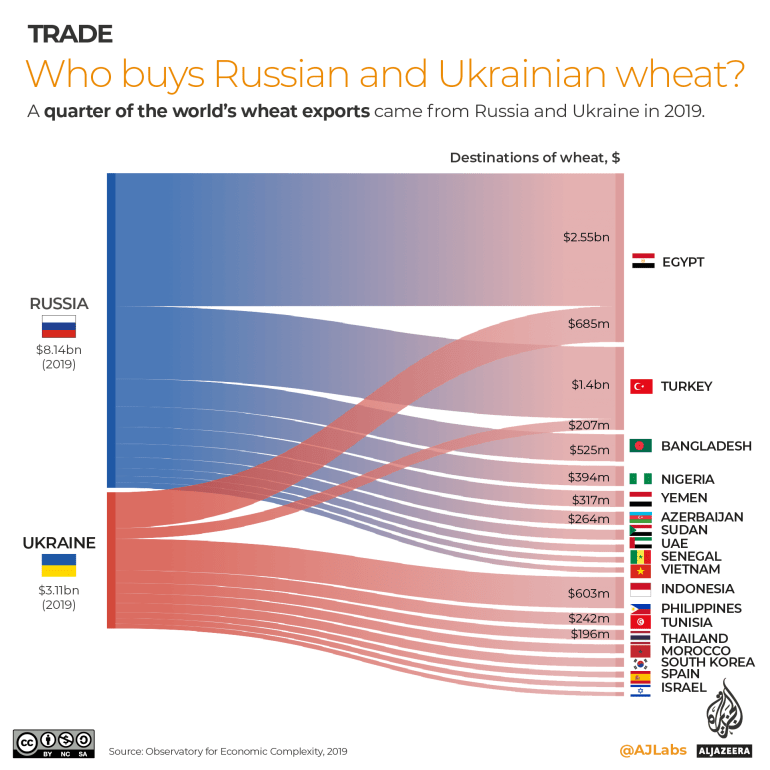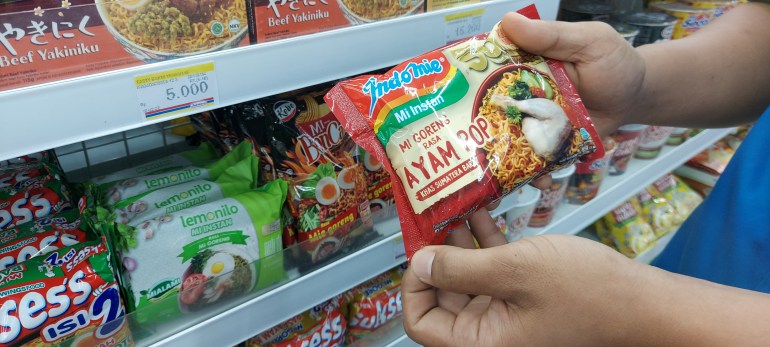Far from Ukraine, Indonesia’s favourite noodles run out of stock
Indonesian shops are running out of Indomie instant noodles as the Ukraine conflict raises fears of wheat shortages.

Medan, Indonesia – For the last week, Indonesian minimarket employee Muhammad Nasir has been busy fielding inquiries.
Customers in Medan, North Sumatra all want to know the same thing: Why are there hardly any Indomie instant noodles left on the shelves?
Keep reading
list of 4 itemsPlane carrying 132 crashes in southern China
Biden to travel to Poland to discuss Ukraine war with Duda
Russia’s invasion of Ukraine: List of key events from day 26
“People have been coming up to us and asking why there isn’t any Indomie left,” Nasir told Al Jazeera. “We still have stocks of some other brands, but Indomie is by far the most popular and we have not had any new deliveries in recent weeks. We don’t know what to tell them.”
Shops all over the city have been affected, with many down to their last few packets, Nasir said.
One of Indonesia’s best-loved foodstuffs, Indomie bills itself as “the pioneer of instant noodles in Indonesia” and produces some 19 billion packs annually for sale in more than 100 countries.
But now, the war in Ukraine, one of Indonesia’s biggest suppliers of wheat, has raised fears for the supply of the snack, which is made from wheat flour. So far, the impact of the conflict on Indonesia’s wheat supply remains unclear, although anecdotal evidence from local shops and restaurants suggests products made from the staple are becoming harder to find.

Ukraine exported nearly 3 million tonnes of wheat and meslin – a cereal comprising a mixture of wheat and rye – to Indonesia in 2020, making it the top supplier of the grain to the country, according to Indonesia’s National Statistics Bureau. That same year, Argentina exported 2.63 million tonnes of wheat and meslin to the Southeast Asian country, while nearby Australia provided almost 831,000 tonnes.
Earlier this month, Indonesian President Joko “Jokowi” Widodo warned that global food prices have risen as a result of the conflict in Ukraine, putting pressure on the local food market.
“We must manage the economy carefully at this time,” Jokowi said.
Indomie’s iconic noodles, known for their colourful packaging and punchy flavour that comes from powder and oil that can be added to taste, are enjoyed across Indonesia by people ranging from students on a budget to those wanting a quick snack.
The base noodles and sauces, which come in flavours such as chicken broth and curry, can be mixed with other ingredients like vegetables and meats for a fuller meal.
At the Bakso Anjar Family Cafe in Medan, employee Fariz told Al Jazeera that while Indomie appeared to be in plentiful supply in the local market where the café purchases the noodles in bulk, the price had risen from 98,000 Indonesian rupiah ($6.85) for a box of 40 packets to 102,0000 Indonesian rupiah ($7.15) in the past few weeks.
Fariz, who like many Indonesians has one name, said his café had yet to have difficulty sourcing Indomie in the city.
“But if that happens, we will find alternatives from other brands and then from other sources if need be like fresh noodles which are locally produced,” said Fariz, whose café mixes Indomie with chicken or meatballs to make a flavourful noodle soup. “We are not scared yet.”

Indomie did not respond to requests for comment on whether the war in Ukraine has had an impact on wheat supplies and or its production.
Jennifer Kim Rosenzweig, the deputy country director of the World Food Programme, Indonesia, said her organisation is monitoring the situation to see how supply might be affected.
“At this time we do not know what the impact will be on the price of wheat or related production,” Rosenzweig told Al Jazeera.
But Lestary J Barany, a research assistant at the Center for Strategic and International Studies (CSIS), said there is already evidence the country’s wheat supply is under strain.
“When Russia invaded Ukraine, activities at Ukrainian ports stopped,” Barany told Al Jazeera. “Many granaries were located in the east, close to areas occupied by Russian troops. Thus, the threat from the supply side for these materials is becoming more real.”
Global wheat prices hit a 14-year high earlier this month and remain volatile, Barany said, while noting that flour consumption in Indonesia also grew by about 5 percent in 2021, according to the Indonesian Flour Producers Association.
“Imported wheat from Ukraine is widely used by producers of noodles, bread, and flour,” she said.
Sources of food
Dicky Senda, a writer and food activist based in Mollo, East Nusa Tenggara, said any disruption should be used as an opportunity for self-reflection about the sources of Indonesia’s food.
“Local products like corn are considered a second-class food whereas rice, much of which is imported, is considered a first-class food in Indonesia,” Senda told Al Jazeera.
“In Mollo, we are trying to start a movement around the potential of local products, with the message that people should try to eat more locally.”
Senda said the prices of local foodstuffs did not provide much of an incentive for farmers to grow alternatives to Indonesia’s staple imports such as corn and cassava. “At the moment, local corn is 3,000 Indonesian rupiah ($0.21) per kilo whereas rice is 12,000 Indonesian rupiah ($0.84) per kilo, so a corn farmer needs to sell four kilos of corn to make the same amount as a kilo of rice,” he said.
Senda said the fact imports could be affected by events such as war should act as a warning to Indonesia not to be dependent on food from outside the country.
“The war may be far away but it can still affect what is on our plates,” he said.